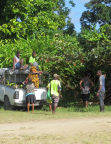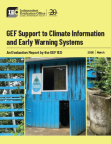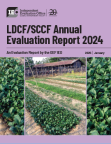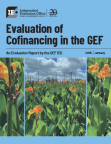Drawing on terminal evaluations submitted between September 2022 and December 2024, the analysis covers projects implemented under GEF-4 through GEF-7 across 27 countries - primarily in Africa and Asia - and reflects a total investment of $200.9 million in GEF financing and $1.6 billion in…
LDCF/SCCF Annual Evaluation Report (AER) 2025
Evaluation of International Waters Focal Area
The evaluation of the International Waters (IW) focal area has reviewed and synthesized available evaluative evidence on the relevance, effectiveness, coherence, impact, and sustainability of 277 projects across GEF-5 to GEF-8, covering more than 140 countries. The total GEF grant for these…
Formative Evaluation of the Global Biodiversity Framework Fund (GBFF)
The Global Biodiversity Framework Fund (GBFF) was established in August 2023 under the Convention on Biological Diversity (CBD) and is hosted by the GEF. The GBFF mobilizes new grants and concessional finance across eight action areas to advance implementation of the Kunming-Montreal Global…
GEF Annual Performance Report (APR) 2025
The Annual Performance Report (APR) of the Global Environment Facility’s (GEF) Independent Evaluation Office (IEO) presents a comprehensive assessment of the performance of GEF activities, processes, and the factors that influence performance. It also evaluates the quality of monitoring and…
Evaluation of GEF Support to Climate Information and Early Warning Systems (CIEWS)
Climate information and early warning systems (CIEWS) are a vital part of reducing vulnerability to the impacts of climate change and building climate change resilience. Climate and weather information dissemination has become synonymous with early warning systems for responding to the hazards…
Evaluation of the GEF Support for Nature-based Solution (NbS)
While the GEF does not have an operational definition of nature-based solutions (NbS), the partnership has been supporting endeavors to protect, restore, and sustainably manage natural resources for almost three decades. Moreover, GEF projects have been leveraging several environmental…
LDCF/SCCF Annual Evaluation Report (AER) 2024
The LDCF/SCCF AER 2024 reports on the Funds through synthesis of evaluative evidence, findings, conclusions, and recommendations from five recently conducted GEF Trust Fund evaluations that also cover LDCF/SCCF projects. The synthesis addresses four primary themes: agriculture, food security,…
Evaluation of Cofinancing in the GEF
Since its establishment, the Global Environment Facility (GEF) has disbursed over $24 billion, leveraging an additional $138 billion in cofinancing for projects that generate global environmental and adaptation benefits. The 2018 Updated Co-Financing Policy highlights cofinancing’s role in…
Evaluation of GEF Interventions in the Chemicals and Waste (CW) Focal Area
This evaluation assesses the relevance, effectiveness, and sustainability of GEF interventions in the chemicals and waste sector. Building on prior IEO assessments of the chemicals and waste focal area, it examines the alignment of these interventions with international conventions and the needs…
Evaluation of Components of the Results-Based Management (RBM) System
The results-based management (RBM) system of the Global Environment Facility (GEF) aims to capture and report on the outcomes of GEF projects, enhance management effectiveness, and strengthen accountability. This system integrates lessons learned into decision-making while tracking progress…









